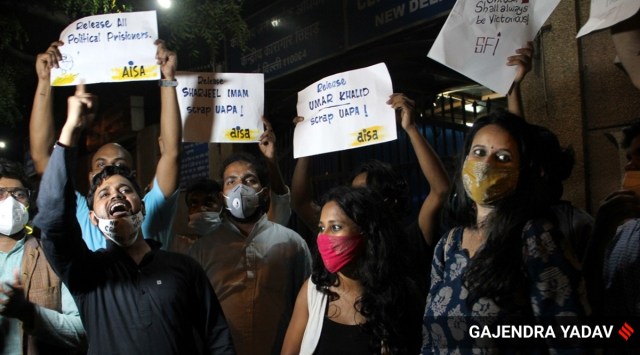While it declined to interfere with the bail order, the bench of Justices Hemant Gupta and V Ramasubramanian said “in a bail application, a 100-page judgment discussing all laws is surprising us” and “can have pan-India ramification”.

It said “the manner in which the High Court had interpreted the Act (UAPA) will probably require examination by the Supreme Court”.
Story continues below this ad
Directing that “in the meantime, the impugned judgment shall not be treated as a precedent and may not be relied upon by any of the parties in any of the proceedings,” the bench said “what we can say is, bail has been granted (to the student activists) and they will not be affected but will stay the effect of the HC order”.
The bench “agreed” with “concerns” raised by Solicitor General Tushar Mehta that the interpretation of the UAPA by the HC in the verdict raised several questions especially “since the legality of UAPA did not arise (in the proceedings before the HC)”.
Mehta said the grant of bail need not be reversed, but the order be stayed as “it virtually records acquittal for accused” and that other accused are moving for bail citing the order.
Senior Advocate Kapil Sibal, who appeared for the accused, said he agreed that it requires a Supreme Court ruling, but “staying this would mean the order is prima facie stayed. We too also have a lot to say. Let us not do it in this kind of fashion. In the meantime, let us not treat the HC order as a precedent”.
Story continues below this ad
The bench, in its order, too “clarified that the release of the respondents on bail is not being interfered at this stage”.
At the outset, Mehta said the HC judgment had “turned the UAPA on its head along with the Constitution”.
Justice Gupta said “since the issue is important and can have pan-India ramification, we will issue notice and hear the parties”.
Referring to the HC observation that “in its anxiety to suppress dissent, in the mind of the State, the line between the constitutionally guaranteed right to protest and terrorist activity seems to be getting somewhat blurred”, Mehta asked how the HC could make such comments when there exists no evidence to that effect.
Story continues below this ad
He said the incident took place during the visit of the US President, that there were witness statements showing clear role of all conspirators to create a law and order problem during that time to show India in poor light.
Pointing out that 53 people were killed and over 700 injured in the riots, the Solicitor General said the HC order trivialises all this in the name of “right to protest”.
“Right to protest, how can it be right to kill and injure?” he asked.
Additional Solicitor General Aman Lekhi said the verdict imports ambiguity in section 15 of UAPA by substituting with a test on its own.
Story continues below this ad
The bench said the manner in which the HC had interpreted the Act “will probably require examination”.
Objecting to the HC order, Mehta said hundreds were injured in the riots, but the court said that since the riots were controlled, there was no offence.
He said it is like saying that though someone placed a bomb, the intensity of the offence is reduced because it was defused by bomb disposal squads.
He said the HC order stated that the intention of Parliament in invoking UAPA was only to deal with matters limited to Defence of India as provided in Entry 1, List 1 of the Constitution.
Story continues below this ad
This, he said, virtually sets aside the UAPA since the High Court could not have said Entry 1 of Union List of the Constitution was relatable to only military actions during the war.
Mehta wondered if this meant it will be unconstitutional to invoke the Act except under these circumstances.
“If I kill someone in a murderous attempt, then UAPA will not apply even if I am a terrorist?” he asked. “The HC has watered down (UAPA).”
The bench said: “We agree with your concerns. The legality of the Act did not arise (in the proceedings before the High Court). That’s why we are issuing notice.”










